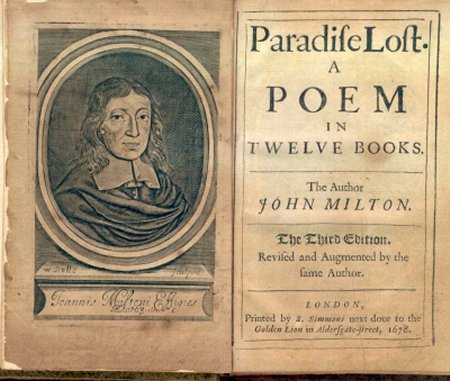
英国名诗120首(英汉对照)-2
陈水明(1962届)译

John Milton (December 9, 1608 - November 8, 1674) was an English poet, polemicist, a scholarly man of letters, and a civil servant for the Commonwealth of England under Oliver Cromwell.
8. On His Deceased Wife
by John Milton
Me thought I saw my late espoused Saint
Brought to me like Alcestis from the grave
Whom Joves great Son to her glad husband gave,
Rescu’d from death by force though pale and faint,
Mine as whom washt from spot of child-bed taint,
Purification in the old Law did save,
And such, as yet once more I trust to have
Full sight of her in Heaven without restraint,
Came vested all in white, pure as her mind:
Her face was veil’d, yet to my fancied sight,
Love, sweetness, goodness, in her person shin’d
So clear, as in no face with more delight,
But O as to embrace me she inclin’d
I wak’d, she fled, and day brought back my night.
*Alcestis 系希腊神话中人物,她刚死去,大力神赶来和死神决斗把她夺回来交给她的丈夫。
8. 梦亡妻
约翰•密尔顿
夜来忽见亡妻,似大力神拯仙女返世时,墓里归来,苍白弱无力;又似古律所载,被救产妇,洗去血迹。正如予坚信,在天重逢无拘泥。伊来身着圣洁衣,虽面纱相遮,仍透温存、贤淑、笑脸,美丽无伦比。方俯身相抱,噫兮!梦醒来,伊消失,黑夜成白日
*此诗系作者为纪念其妻子凯瑟琳、伍德考克所写。读此诗时颇令人忆及苏轼《江城子—悼亡》一词。
* 约翰、密尔顿 (1608-1674) 英国诗人。英国革命时期曾任克伦威政府拉丁文秘书,积劳成疾,双目失明。王朝复辟后,被捕入狱。释放后专门写诗。著有《失乐园》、《复乐园》、《力士参孙》
9. On His Blindness
by John Milton
When I consider how my light is spent
Er half my days, in this dark world and wide,
And that one talent which is death to hide,
Lodged with me useless, though my soul more bent
To serve therewith my Maker, and present
My true account, lest He returning chide;
“Doth God exact day-labor, light denied?”
I fondly ask. But Patience, to prevent
That murmur, soon replies, “God doth not need
Either man’s work or his own gifts, who best
Bear his mild yoke, they serve him best. His state
Is kindly, thousands at his bidding speed,
And post o’ver land and ocean without rest;
They also serve who only stand and wait.”
9. 失明
约翰•密尔顿
思天年尚未半,
便坠盲境,于广阔而黑暗之世中度生;
恐才能之无用,上苍愤怒,
愿尽心效力,献予之虔诚。
喃喃问:“造物令服役,尚褫我光明?”
忍神止云:“上苍否求人归其所赐,抑或求人之虔诚。
耐其驱使即最佳侍奉。
率土之滨,听命奔波、焚膏继咎者,系为之服役;
伫立待命者,亦系侍奉。”
10, To Cyriack Skinner
by John Milton
Cyriack, this three years’ day , though clear
To outward, of blemish or of spot,
Bereft of light, their seeing have forgot;
Nor to their idle doth sight appear
Of sun or moon or star throughout the year,
Or man, or woman. Yet Iargue not
Against Heaven’s hand or will, nor bate a lot
Of heart or hope, but still bear up and steer
Right onward. What support me, doest thou ask?
The concience, friend, to have lost them overplied
In liberty’s defense, my noble task,
Of which all Europe talks from side to side
This thought might lead me through the world’s vain mask
Content, though blind, had I no better guide.
10.致西里亚克、斯金纳
约翰•密尔顿
西里亚克仁兄,
三年来于之双目,
虽清晰可张
却将视线忘,
眸中难进光,
眼内未现男女像,
群星月亮与太阳。
但予从未反上帝意旨,
抑丝毫丧失信心希望。
若问何事支撑?
系于捍卫自由中
因过劳失去之友人与天良;
神圣使命
于欧洲传扬。
此种信仰将引我,
纵否能更好引导,
亦能满意于世上遨游,
虽然目盲。
11.On the Late Massacre in Piedmont
by John Milton
Averge, O lord! Thy slaughter’d Saint, whose bones
Lie scatter’d on the Alpine mountains cold;
Even them who kept thy truth so pure of old,
When all our fathers worshipt stock and stones.
Forget not: in Thy book record their groans
Who wer Thy sheep, and in their acient fold
Slain by the bloody Piemontese, that roll’d
Mother with infant down the rocks. Their moans
The vales redoubled to the hills, and they
To Heaven. Their martyr’d blood and ashes sow
O’er all the Italian fields, where still both sway
The triple tyrant: that from these may grow
A hundre-fold, who having learnt Thy way,
Early fly the Babylonian woe.
11. 沛蒙特大屠杀
约翰•密尔顿
复仇,吾等之主!
尔之圣徒遭屠戮,
于寒冷之阿尔卑斯山
抛尸撒骨。
吾等祖辈崇拜图腾时,
被戮者即为尔之信徒。
否能忘,
尔之书中有此纪录
圣徒为尔之羔羊
于羊圈中
被嗜血之沛蒙特人屠戮,
母亲与婴儿抛入山谷。
哭声于谷中回荡
直达天府
祈将殉道者血肉
植入意大利国土。
尽彼三重冠暴君,
作威作福,
但种子仍百倍生长,
令巴比伦覆灭之悲不复。
*1)沛蒙特,位于意大利西北部,1655年萨伏亦公爵在该处屠杀信基督教的夫都瓦人(Vaudois)此诗为抗议此事而作。
2)三重冠暴君指罗马教皇。
12. When the Assault was Intended to the City
by John Milton
Captain, or colonel, or knight in arms,
Whose chance on these defenceless doors may seize.
If deed of honour did these please,
Guard them, and him within protect from harms.
He can requite thee; for he knows the charms
That call fame on such gentle acts as these,
And he can spread thy name o’er lands and seas,
Whatever clime the sun’s bright circle warms.
Lift not thy spear against the Muses’ bower;
The great Emathian conqueror did spare
The house of Pindrus, when temple and tower
Went to the ground; and the repeated air
Of sad Electtra’s poet power
To save Athenian walls from ruin bare.
12. 写于敌军陷城之前
约翰•密尔顿
上尉上校骑士先生
诸君将陷无防之门
如诸君乐施仁政,
请护彼平民及诗人。
诗人将报尔
以其动人作品
播尔之善举与美名
令普天之下处处闻。
勿挥戈击缪斯家园。
昔者亚帝征服底城,
毁灭歌舞楼榭无算
却令保护诗人旧居,
品达卢斯家得保全
欧氏悲歌歌一曲
曾免雅典化飞烟。
*1)此诗写于1542年10月保皇党军进攻伦敦时。
2)亚帝指亚历山大大帝。
3)品达卢斯,古希腊著名诗人。
4)欧氏指古希腊悲剧诗人欧立匹德斯(Euripides)。
5)此诗用意与明代女诗人郭顺贞《上俞将军书》类似。
13. Sonnet 75 from Amoretti
by Edmund Spenser
One day I wrote her name upon the strand,
But came the waves and washed it away;
Agayne I wrote it with a second hand,
But came the tyde, and made my paynes his pray.
“Vayne man,” says she, “that doest in vain assay,
A mortal thing so to immortalize,
For I my selve shall lyke to this decay,
And eek my name bee wiped out likewise.”
“Not so,” quod I, “let baser things devise,
To die in dust, but you shall live by fame;
My verse your virtues rare shall eternize,
And in the heavens write your glorious name,
Where whenas death shall all the world subdew,
Our love shall live, and later life renew.”
*agayne = again; tyde = tide; paynes = pains; pray = prey; vayne = proud ; vain assay = try in vain; lyke = like; eek = also; quod I = says I; whenas = whereas; suddew = subdue
13 .爱情小唱第75首
爱德蒙特•斯宾塞
书伊芳名于海滩,顷刻毁于波浪;
复书又化乌有,恨潮汐之无良。
被美前致词:
“君子何为者,欲必死者永生,无乃太伤?
予身将与草木同朽,予名亦偕亡。”
“小人必化尘土,卿定永留芳。
予诗将使卿之品德永恒,芳名永驻天堂。
纵死神毁灭宇宙,吾俩定火中槃涅,比翼颉行。”
*爱德蒙特、斯宾塞 (1552-1599 ),英国诗人。
14. To Lucasta, Going to the Wars
by Richard Lovelace
Tell me not, sweet, I am unkind,
That from the nunnery
Of thy chaste breast and quiet mind
To war and arms I fly.
True, a new mistress now I chase,
The first foe in the field:
And with a stronger faith embrace
A sword, a horse, a shield.
Yet this inconstancy is such
As thou too shalt adore;
I could not love thee, Dear, so much,
Loved I not Honor more..
14. 出征前致女友
理卡德•腊伍勒斯
挥别心上亲,敬语娴静卿。
掉头沙场去,休恨我无情。
沙场寻新爱,伊即首遇凶。
剑盾与马上,定执伊强拥。
窃意此无常,亦博卿卿崇。
予若觳觫子,安得匹卿名。
*里查德、腊伍莱斯1618-1657 英国骑士派诗人。此时系为其女友露卡斯妲所写。
15. Proportion
by Ben Jonson
It is not growing like a tree
In bulk, doth make man better be:
Or standing long an oak, three hundred year,
To fall a log at last, dry, bald, and sere;
A lily of a day
Is fairer far in May,
Although it fall and die that night;
It was the plant and flower of light.
In small proportions we just beauties see;
And in short measures life may perfect be.
15.均衡
本•炯声
魁伟虽如树,未必令人强。
大橡生百年,终于枯干亡。
百合花寿短,五月压群芳。
纵朝吐蕊而夕凋,亦为美中王。
容小丽易见,生短质易良。
*此诗颇有《老子》哲学味道
*本、炯声 (1572 ?--1637),英国剧作家,诗人,演员,翻译家,曾获桂冠诗人称号。

William Shakespeare (April 23, 1564 - April 23, 1616) was an English poet and playwright, widely regarded as the greatest writer in the English language and the world's pre-eminent dramatist. He is often called England's national poet and the "Bard of Avon".
16. Sigh No More, Ladies
by William Shakespeare
Sigh no more, ladies;
Men were deceivers ever;
One foot in sea, and one shore,
To one thing constant never.
Then sigh not so,
But let them go,
And be you blithe and bonny,
Converting all your sounds of woe
Into Hey nonny, nonny.
Sing no more ditties, sing no mo
Of dumps so dull and heavy;
The fraud of men was leavy.
Then sigh not so,
But let them go.
And be you blithe and bonny,
Converting all your sounds of woe
Into Hey nonny, nonny.
*nonny无实意,系押韵,这里作欢乐解。Leavy = leafy. Dumps: low spirits
16.淑女,勿长吁
莎士比亚
好女儿,勿长吁。
男子欺心本常事。
脚踩两家船,爱情何尝能专一。
莫叹息,随他去。
化悲声成欢娱。
别唱悲歌,
别唱悲歌伤心肺。
夏日树多叶,男儿少情意。
莫叹息,随他去。
化悲哀,成欢娱。
* 莎士比亚(1564-1616),英国和世界文学史上最伟大作家之一。莎士比亚系起笔名,意为摇枪。其全集在我国有朱生豪,曹未凤,梁实秋等译本。此诗系摘自喜剧《无事生非》
17.Sonnet 94
by W. Shakespear
They that have power to hurt, and will do none,
That do not do the thing they most do show,
Who, moving others, are themselves as stone,
Unmoved, cold, and to temptation slow ---
They rightly do inherit Heaven’s graces,
And husband nature’s riches from expense;
They are the lords and owners of their faces,
Others, but stewards of their excellence.
The summer’s flower is to the summer sweet,
Though to itself it only live and die;
But if their flower with base infection meet,
The basest weed outbraves his dignity:
For sweetest thing turn sourest by their deeds;
Lilies that fester smell far worse than weeds.
17. 十四行诗94
莎士比亚
斯人应受上天宠。
能伤人而不伤,
有能而不逞
能令人动情,而己若霜雪,
沉静、冰冷、不为诱惑动;
否暴殓天物,
能主宰个人尊容。
背离此者仅为自身丽质之仆童。
夏日之花为夏日吐艳,
自开放复自凋零。
蒙污薰草前,
莸亦自称荣。
最甜者变质成最酸
腐百合较腥草更腥
*此诗亦有《老子》哲学味道。后两句类似“西子蒙不洁,人皆掩鼻而过之”。 |






![]()
![]()
![]()
![]()
